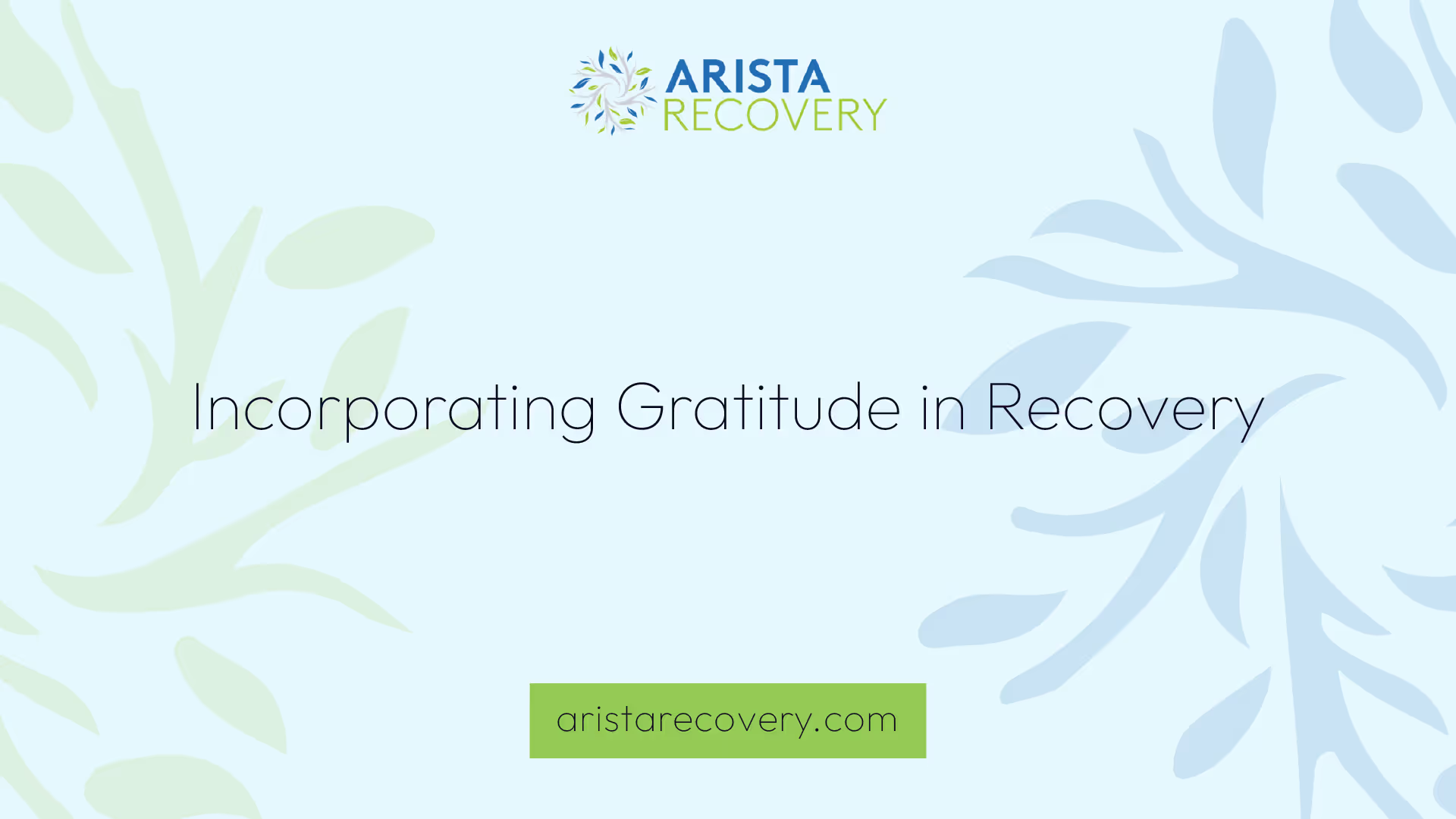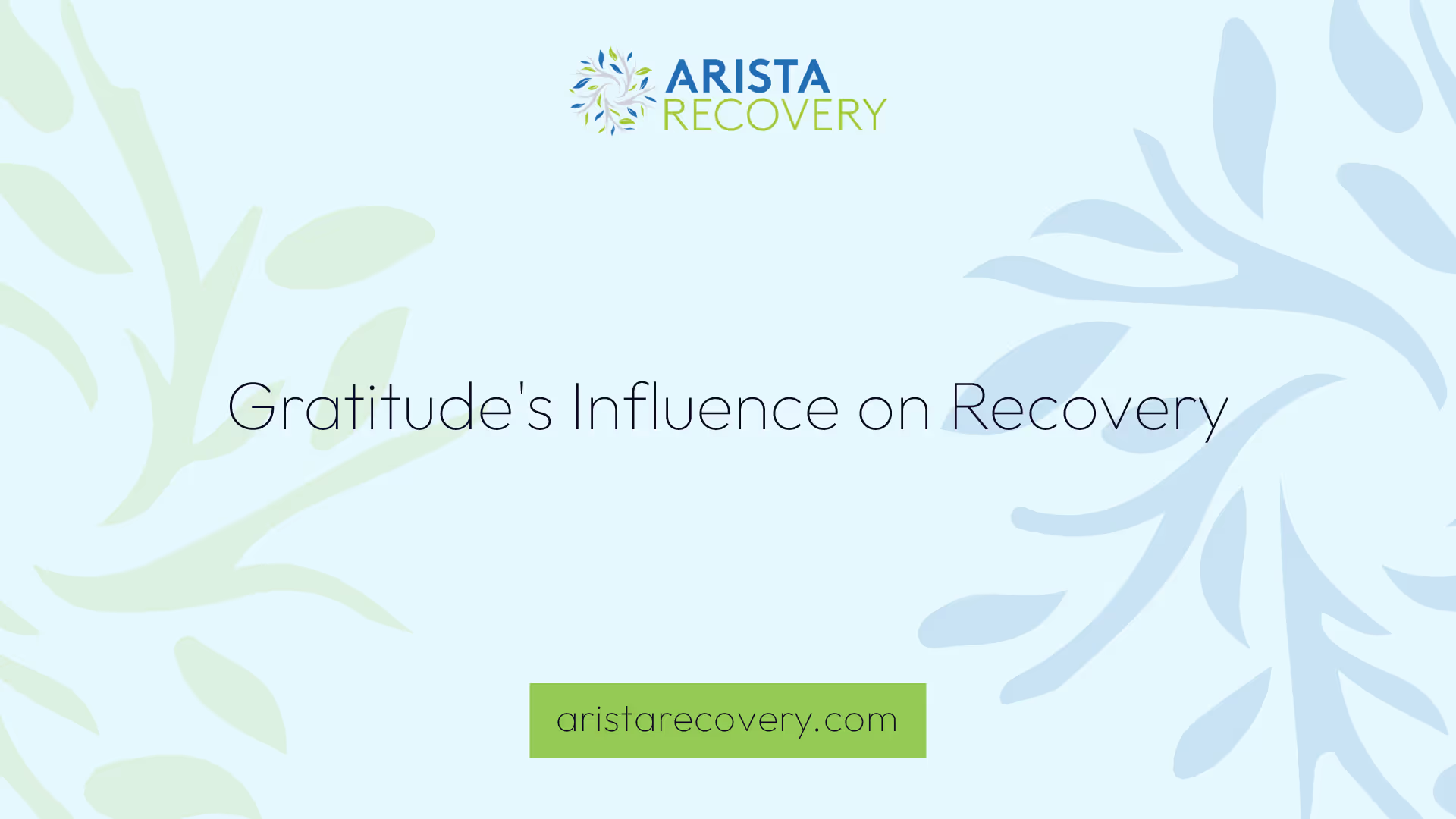Gratitude in Recovery


The Role of Gratitude in Recovery
Gratitude plays a significant role in the recovery process by enhancing treatment outcomes and promoting overall well-being. This section delves into the impact of gratitude and the benefits of practicing it during recovery.
Understanding Gratitude's Impact
Gratitude is defined as a disposition that allows individuals to perceive and appreciate the positive aspects of life. It is a powerful force that can significantly influence the healing journey of individuals in recovery [1]. By encouraging individuals to express and cultivate gratitude, recovery programs can foster a more positive and supportive environment.
Positive psychology, which focuses on human flourishing and optimal functioning, recognizes gratitude as a key factor in addiction recovery. This perspective emphasizes the importance of gratitude in helping individuals shift their focus from negative experiences to positive ones, thereby promoting mental and emotional well-being [1].
Benefits of Practicing Gratitude
Practicing gratitude offers numerous benefits that can significantly enhance the recovery process. Research supports that gratitude leads to greater levels of happiness, positive emotions, improved mental and physical health, and stronger interpersonal relationships [1]. These benefits are crucial for individuals in recovery, as they contribute to a more holistic and sustainable healing journey.
By incorporating gratitude into their daily lives, individuals in recovery can experience these profound benefits, ultimately making their journey more manageable and fulfilling. For more on the promises of recovery, explore our article on the promises of recovery.
Gratitude can also play a vital role in fostering a sense of community and connection. By acknowledging and appreciating the support from loved ones and fellow recovery participants, individuals can build stronger relationships, which are essential for long-term recovery success. Engaging in service activities and expressing thanks can further solidify these bonds, as discussed in service keeps you sober.
Understanding and harnessing the power of gratitude can be transformative for individuals in recovery, making it a critical component of effective treatment programs.
Incorporating Gratitude in Recovery

Cultivating gratitude can play a crucial role in addiction recovery. Here are some practical ways to foster a grateful mindset and tips for maintaining it over time.
Practical Ways to Cultivate Gratitude
Incorporating gratitude into daily life can significantly aid in the recovery process. Here are several methods individuals can use:
- Gratitude Journal: Writing down three things to be grateful for each day can help shift focus from negative thoughts to positive ones.
- Present Moment Focus: Being mindful of the present moment and appreciating it can enhance feelings of gratitude.
- Expressing Appreciation: Taking the time to thank others can strengthen social bonds and reinforce a sense of community.
- Helping Others: Volunteering or helping those in need can foster feelings of gratitude and provide a sense of purpose.
Tips for Maintaining a Grateful Mindset
Maintaining a grateful mindset is essential for long-term recovery. Here are some tips to help keep gratitude at the forefront:
- Keep a Gratitude Journal: Consistently updating a gratitude journal can serve as a daily reminder of positive aspects in life.
- Focus on Relationships: Building and nurturing relationships can provide emotional support and enhance feelings of gratitude.
- Appreciate Small Things: Paying attention to and appreciating small, everyday moments can help maintain a positive outlook.
- Share Appreciation: Communicating gratitude to individuals who have made an impact can reinforce positive feelings and strengthen connections.
- Volunteer: Giving back through volunteering can help maintain a sense of gratitude and purpose.
Cultivating and maintaining gratitude can assist in shifting perspectives from negative thought patterns to positive ones, which is crucial for overcoming challenges during recovery. For more insights on the promises of recovery, visit our article on the promises of recovery.

Gratitude's Influence on Recovery
Shifting Perspectives in Recovery
Gratitude can play a significant role in helping individuals shift their perspectives during the recovery process. By focusing on the positive aspects of life, such as achievements and supportive relationships, individuals can move away from negative thought patterns like self-pity or resentment that can lead to relapse. Expressing gratitude for sobriety has been linked to future abstinence, reinforcing the decision to stay sober and providing a sense of purpose.
For more on how gratitude transforms recovery experiences, explore the promises of recovery.
Fostering Resilience through Gratitude
Gratitude fosters resilience, enabling individuals to rebound from setbacks and cravings more effectively by concentrating on the positives in their lives. This practice can contribute to overall happiness and well-being, helping individuals feel more positive emotions and improve their mental health.
Additionally, gratitude enhances social connections, making individuals more positive towards their partners and more comfortable expressing relationship concerns. Strengthened social networks can be pivotal in maintaining sobriety and preventing relapse. For more information, explore how service keeps you sober.
By incorporating gratitude into their daily routines, individuals can foster resilience and improve their chances of a successful recovery journey.
Social Connections and Gratitude
Gratitude plays a pivotal role in fostering and enhancing social connections, which are crucial for individuals undergoing recovery. Establishing and maintaining these connections can significantly impact the recovery journey by providing emotional support and a sense of belonging.
Strengthening Relationships
Gratitude can enhance social connections and relationships, making individuals more positive towards their partners and more comfortable expressing relationship concerns. This positivity tends to improve communication and trust, critical components in any relationship.
Gratitude helps individuals appreciate the support they receive from their loved ones, creating a cycle of positive reinforcement. This appreciation fosters a deeper connection and strengthens the bond between individuals in recovery and their support network. Regular expressions of gratitude can lead to more meaningful and resilient relationships, which are vital in maintaining sobriety and preventing relapse.
Support Systems in Recovery
Support systems play a crucial role in the recovery process. Gratitude encourages individuals to seek out and connect with supportive communities, finding value in these connections and sharing positive sentiments with trusted individuals. By fostering a sense of belonging, gratitude helps individuals feel less isolated and more engaged with their recovery journey.
Gratitude can also positively impact physical health, which is essential for those in recovery. Regular practice of gratitude has been shown to lower blood pressure, improve sleep, and strengthen the immune system. These physical benefits contribute to overall well-being and resilience, supporting long-term recovery [6].
Furthermore, expressing gratitude within support groups and recovery programs can create a more positive and encouraging environment, enhancing the effectiveness of these programs. For more information on the benefits of service in recovery, visit our article on service keeps you sober.
By incorporating gratitude into their daily lives, individuals in recovery can build stronger support systems, fostering resilience and contributing to their overall success in maintaining sobriety. For further reading on the promises of recovery, visit the promises of recovery.
Gratitude for Physical and Mental Health
Gratitude plays a significant role in both physical and mental health, particularly for individuals undergoing recovery. By incorporating gratitude practices into daily routines, individuals can experience numerous benefits that support their journey towards sobriety and overall well-being.
Physical Benefits of Gratitude
Gratitude has been proven to have several positive impacts on physical health. Regularly practicing gratitude can lead to improved physical health outcomes, making individuals feel lighter, more relaxed, and hopeful.
Key physical benefits of gratitude include:
- Lower Blood Pressure: Practicing gratitude can help to lower blood pressure, contributing to better heart health.
- Improved Sleep: Gratitude can improve sleep quality, making it easier to get the rest needed for recovery.
- Stronger Immune System: Gratitude boosts the immune system, helping the body to fight off illnesses more effectively.
- Reduced Aches and Pains: Individuals who practice gratitude often report fewer physical pains and aches.
- Increased Interest in Exercise and Self-care: Gratitude encourages a greater interest in maintaining physical health through exercise and self-care routines.
Mental Well-being and Gratitude Practices
The mental health benefits of gratitude are equally important. Regular practice of gratitude has been shown to lessen negative emotions, increase coping skills, and support long-term recovery.
Some of the mental well-being benefits include:
- Increased Positive Emotions: Gratitude generates positive emotions like joy, optimism, and enthusiasm.
- Better Stress Management: Those who practice gratitude are better able to manage stress and cope with negative situations.
- Less Anxiety and Depression: Gratitude can reduce feelings of anxiety and depression, promoting a more stable mental state.
- Improved Social Connections: Gratitude fosters social bonds, making individuals feel more connected and supported.
- Enhanced Overall Well-being: Gratitude leads to higher life satisfaction and a greater sense of well-being.
Gratitude interventions, such as gratitude journaling, can lead to significant improvements in stress levels, social support, and overall well-being. For more insights on how gratitude can influence recovery, explore our articles on the promises of recovery and service keeps you sober.
By understanding and utilizing the physical and mental health benefits of gratitude, individuals in recovery can enhance their journey towards a healthier and more fulfilling life.
Gratitude in Treatment Programs
Gratitude is a cornerstone in the journey of addiction recovery. Integrating gratitude practices within treatment programs can greatly enhance the recovery process, offering a multitude of benefits.
Gratitude in Support Groups
Support groups, such as Alcoholics Anonymous (AA), often emphasize gratitude as a key component of their recovery programs. Gratitude fosters a positive outlook on life, allowing individuals to appreciate the progress they have made and the obstacles they have overcome.
In support groups, participants are encouraged to share their experiences and express gratitude for their journey and the support they receive. This practice not only boosts self-esteem but also strengthens social connections, making individuals more positive and comfortable in expressing their feelings [4].
Implementing Gratitude in Recovery Programs
Implementing gratitude in recovery programs involves incorporating various practices and activities that promote a grateful mindset. These can include:
- Gratitude Journals: Encouraging individuals to maintain a gratitude journal where they list things they are thankful for each day. This practice can help shift focus from negative to positive aspects of life.
- Group Activities: Organizing group sessions where participants share their gratitude with others. This fosters a sense of community and mutual support.
- Daily Affirmations: Incorporating daily affirmations that focus on gratitude can help reinforce a positive mindset and improve mental well-being [8].
These practices can enhance resilience, improve physical and mental health, and lay the foundation for long-term success in recovery. For more information on how service can support sobriety, visit our page on service keeps you sober.
Gratitude is not just a feel-good emotion; it is a powerful tool that can transform the recovery journey. By integrating gratitude into treatment programs, individuals in recovery can build a stronger, more resilient foundation for lasting sobriety.
Learn more about the promises of recovery and how gratitude plays a crucial role here.
References
[1]: https://friendlyhousela.org/importance-of-gratitude-in-relationships-during-recovery/
[2]: https://www.linkedin.com/pulse/role-gratitude-addiction-recovery-way-cultivate-huseyin-djemil-
[3]: https://lifeskillssouthflorida.com/mental-health-blog/the-importance-of-showing-gratitude-in-addiction-recovery/
[4]: https://www.northstarbehavioralhealthmn.com/resources/gratitude-in-recovery
[5]: https://www.hazeldenbettyford.org/articles/gratitude-early-recovery
[6]: https://www.tpoftampa.com/the-power-of-gratitude/
[7]: https://www.ncbi.nlm.nih.gov/pmc/articles/PMC7649920/
[8]: https://recoverycentersofamerica.com/blogs/how-to-maintain-an-attitude-of-gratitude-during-recovery/
You’re not alone in this.
When mental health challenges and addiction intersect, it can feel isolating. At Arista, we offer compassionate, evidence-based, and trauma-informed care to help you heal, grow, and move forward.
You’re not alone in this.
When mental health challenges and addiction intersect, it can feel isolating. At Arista, we offer compassionate, evidence-based, and trauma-informed care to help you heal, grow, and move forward.
Support that moves with you.
You’ve taken a brave first step. At Arista Recovery, we’re here to help you continue with best-in-class care designed for long-term healing and support.
.webp)






